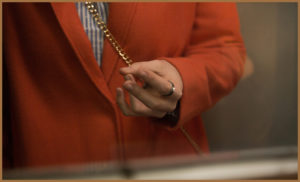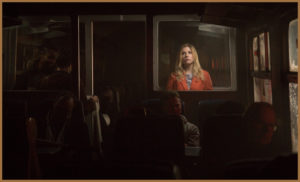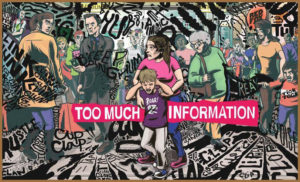As most of you will know, my posts are usually exclusive to Saturdays. However, to help promote the next phase of the National Autistic Society’s ‘Too Much Information‘ campaign, this week the N.A.S. gave me early access to their new autism awareness film: ‘Diverted‘.
With Autism being a spectrum condition, I would be lying if I didn’t say I was concerned about whether the depiction of autism within Diverted was going to resonate with me. But it soon became clear, I had nothing to worry about.

My Reaction to Diverted:
From the get go, I found myself immersed in the events of Diverted, as it starts with the familiar sound of lead autistic actor Saskia tapping her thumb across her fingers in anticipation of an upcoming event.
This action, which for many autists, including myself, is part of a popular coping technique, is extremely common when handling moments of sensory/emotional overload and, in my experience, it has helped with everything from the excitement of a new Marvel film, to the frustration of making it through yet another university lecture, whilst the person in front of me has their laptop screen on full brightness and watches a string of videos ironically captioned ‘the best thing you’ll see all day’.
For Saskia, the reason for her anxiety quickly becomes clear, as the screen cuts from her shaky hand to the train journey from hell – which features a packed carriage, a route diversion and the only thing short of sitting next to Satan himself… rowdy football fans.
Out of the all the triggers which Saskia faces on her journey in Diverted, the thing which resonates most with me, is not one of the loud and disruptive activities on the train, but a kind of blink and you’ll miss it moment, where a man lightly bumps into Saskia.
I know that this may sound minor, in light of everything else that takes place in the 1 minute video, but something about the way the man says ‘sorry’, after the collision, struck a nerve in me, because of how many times something similar has sent me spiralling with insecurities:
- Is this the kind of sorry where he regrets what has happened?
- Is this the kind of sorry where he expect her to laugh with him at the crowded situation?
- Maybe it’s a sarcastic sorry, where he wants Saskia to be the one issuing the apology and is about to get angry if she does not?
You’ll probably say that I’m definitely overthinking it, but this is what it’s like in the head of an autist. We overthink things from 7am to 10pm, and though sometimes it gets better in the morning, it’s often the case that a new day brings a new event to overthink.
I feel this thought is perfectly summed up in the ending message, where Saskia reflects on what happens, and says that ‘unexpected changes can make leaving the house next to impossible’ followed by a message which states ‘feeling judged can make it worst’ – not being judged, but feeling: revisiting the events again and again in our heads.

Although I am aware this isn’t true for all other autists, but for me ‘too much information’ is never as the result of too many things to process, but, is the result of one event refusing to find a place to call home in my mind. Clearly the National Autistic Society understand this, as amongst the many other issues which are demonstrated in this powerful message, Diverted manages to reflect and raise awareness of the personal problems which I have faced whilst going about my daily routine.
I have no doubt that, because of this, Diverted is sure to resonate across the entire spectrum. But it’s my hope that the themes and lessons which appear within the film, will also make their way to every corner of society. This way those who may (or suspect they may) share a train journey, a cinema viewing or a classroom presentation with an autist, might realise that we don’t need the world turning on its head for us to feel more secure and comfortable, we just want greater awareness and a better understanding of the things which can and often do affect us.

Carry on the Conversation:
Don’t forget to share Diverted on Facebook, Twitter and other social channels, after you have watched the video. I would also love to hear any other’s thoughts in the comments section below.
As always I can also be found on Twitter @AutismRevised and via my email: AutisticandUnapologetic@gmail.com.
If you like what you have seen on the site today, then show your support by liking the Autistic & Unapologetic Facebook page and signing up to the Autistic & Unapologetic newsletter (found on the side bar on laptops and underneath if you are reading this via mobile).
Thank you for reading and I will see you on Saturday for more thoughts from across the spectrum.


